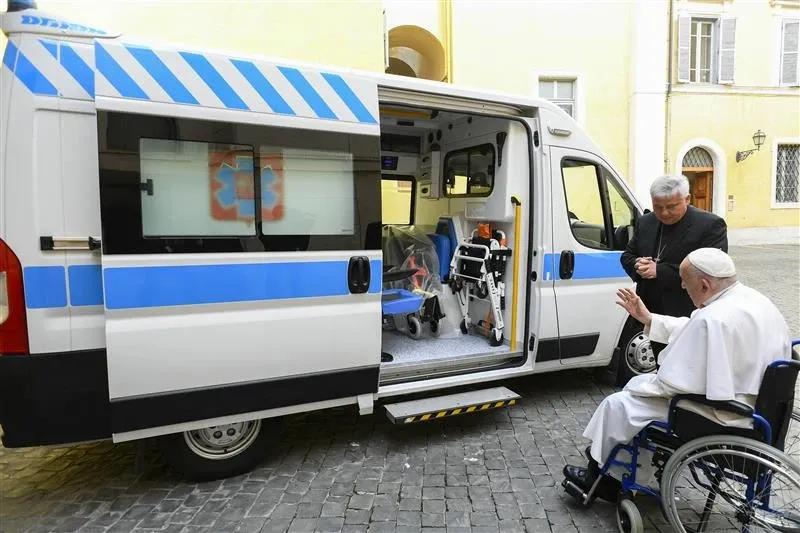“For instance, as a patient draws close to inevitable death from an underlying progressive and fatal condition, certain measures to provide nutrition and hydration may become excessively burdensome and therefore not obligatory in light of their very limited ability to prolong life or provide comfort.”
What does the Pontifical Academy’s new document say?
While reiterating the Church’s long-standing teaching against euthanasia and assisted suicide in several sections, the July booklet has garnered the most attention for its section on “Artificial Nutrition and Hydration,” Section 13. (An official English translation of the booklet is not yet available, so excerpts here come from an unofficial translation generated by Google.)
Catholic teaching allows for the possibility of stopping “burdensome, dangerous, extraordinary, or disproportionate” medical care — such as removing ventilators from patients who are unable to breathe on their own and allowing them to die naturally — and this is not the same as euthanasia.
In Section 13, the PAFL affirmed that for those in a permanent vegetative state — i.e., not actively dying — suspending food and water is different from removing a ventilator because “death is not caused by the disease that continues its course but rather by the action of those who suspend them.”
(Story continues below)
“Upon closer inspection, however, this topic is the victim of a reductive conception of the disease, which is understood as an alteration of a particular function of the organism, losing sight of the totality of the person,” the document continues.
“This reductive way of interpreting the disease then leads to an equally reductive conception of treatment, which ends up focusing on individual functions of the organism rather than on the overall good of the person. The individual functions of the organism, including nutrition — especially if affected in a stable and irreversible way — must be considered in the overall picture of the person[.]”
The PAFL continued by saying that because a person in a vegetative state has to consume food that is “prepared in the laboratory and administered through technical devices,” such interventions are “not simple health care procedures.”
“[T]he doctor is required to respect the will of the patient who refuses them with a conscious and informed decision, also expressed in advance in anticipation of the possible loss of the ability to express himself and choose,” the PAFL wrote.
The PAFL noted that Pope Francis has emphasized the importance of considering the whole person, not just individual bodily functions, when making medical decisions.
A departure from previous teachings?
Father Tad Pacholczyk, senior ethicist at the National Catholic Bioethics Center, told CNA that in his reading, the PAFL document “does not significantly depart” from what the Church has said on the topic of ANH in the past.
The Church has traditionally taught that “medically assisted nutrition and hydration become morally ‘extraordinary’ if they cannot reasonably be expected to prolong life or would cause significant physical discomfort or complications in the use of the means employed,” he said.
In light of this, the text emphasizes the “perennial need for careful assessment and discernment in terms of the benefits and burdens that may be associated with the administration of artificial nutrition and hydration (ANH) to each particular patient.”
Further, he said, the text seems to imply that such careful assessment and discernment does not always happen, but that some people rely on problematic generalizations like “ANH is always required” or “ANH is always aggressive therapy” — both of which, he said, are incorrect.
“The circumstances and particulars will be important, so that in some instances, here or there, ANH may indeed be able to be categorized as ‘aggressive therapy,’ while in many others, it clearly cannot, but must instead be understood as a proportionate, and thus an obligatory means of caring for our loved ones,” Pacholczyk said.
Taking a different view in an Aug. 13 commentary at The Pillar, Catholic ethicist Charlie Camosy warned that the PAFL’s statements could be misunderstood in the context of what Pope Francis calls a “throwaway culture” — a culture in which numerous jurisdictions around the world allow, and even promote, euthanasia and assisted suicide and which “tries to hide the value of disabled people with consciousness disorders[,] making it easier to aim at their deaths.”
“[T]he pontifical academy’s new text appears to suggest that, because the food and hydration given to disabled, so-called ‘vegetative’ patients is prepared in a laboratory and administered through technology, offering them to such patients does not amount to ‘simple care procedures.’ It could therefore be thought of as a medical treatment which could, in principle, be withdrawn, rather than the kind of basic care which can never be withheld,” Camosy wrote.
“From a bioethical perspective, this would strike many ethicists as an odd framing of the issue, to say the least,” he continued.
“The nutrition given to such disabled human beings is no more made in a laboratory than a protein shake powder. And feeding tubes are extremely simple devices that don’t require any machine or other special technology. Many Catholic bioethicists would see feeding a disabled person through a tube as little different from feeding them with a spoon.”
An ongoing case
Section 13 of the PAFL’s document is germane to an ongoing bioethical case in the U.S., that of Margo Naranjo.
Naranjo, 28, suffered severe brain damage in a 2020 car accident. Though not technically on “life support” and able to breathe without the use of a ventilator, she is today profoundly disabled and not able to speak, eat, or drink on her own.
Naranjo’s parents, Mike and Cathy, are Catholic and have frequently called for prayers for Margo’s healing and their family since the car accident. But in a now-deleted Facebook livestream, Cathy announced on July 7 that she and Mike — in accordance with what they believe to be Margo’s pre-accident wishes — had decided to allow Margo to die by starvation in hospice.
Court records show that a Denton County Probate Court judge appointed a temporary guardian for Margo and issued a temporary restraining order against her parents on July 19, precluding them from stopping her food and water.
Naranjo’s situation has drawn comparisons to that of Terri Schiavo, a Florida woman who was left severely brain-damaged from oxygen deprivation after suffering a heart attack and lived for a decade and a half in a persistent vegetative state. In 2005, Schiavo died of starvation after her husband insisted he was complying with her wishes by removing her feeding tube, despite a protracted and very public court battle and the pleading of her family.
Jonah McKeown is a staff writer and assistant podcast producer for Catholic News Agency. He holds a Master’s Degree from the University of Missouri School of Journalism and in the past has worked as a writer, as a producer for public radio, and as a videographer.








